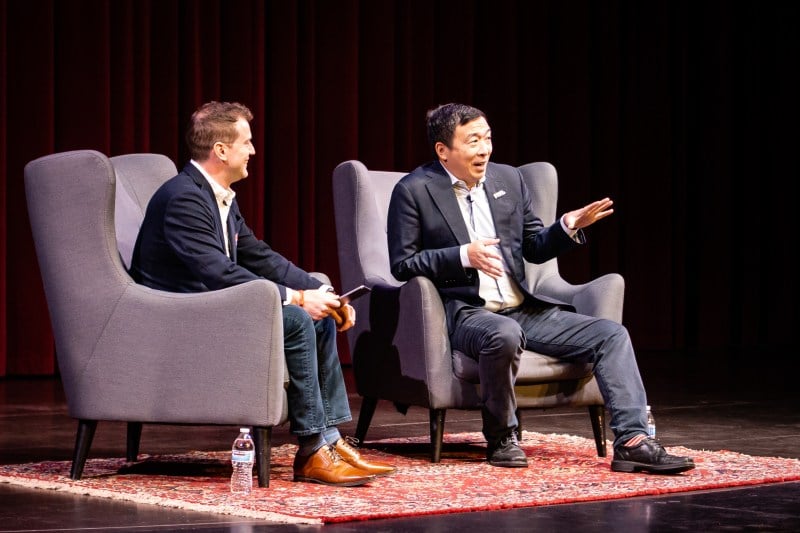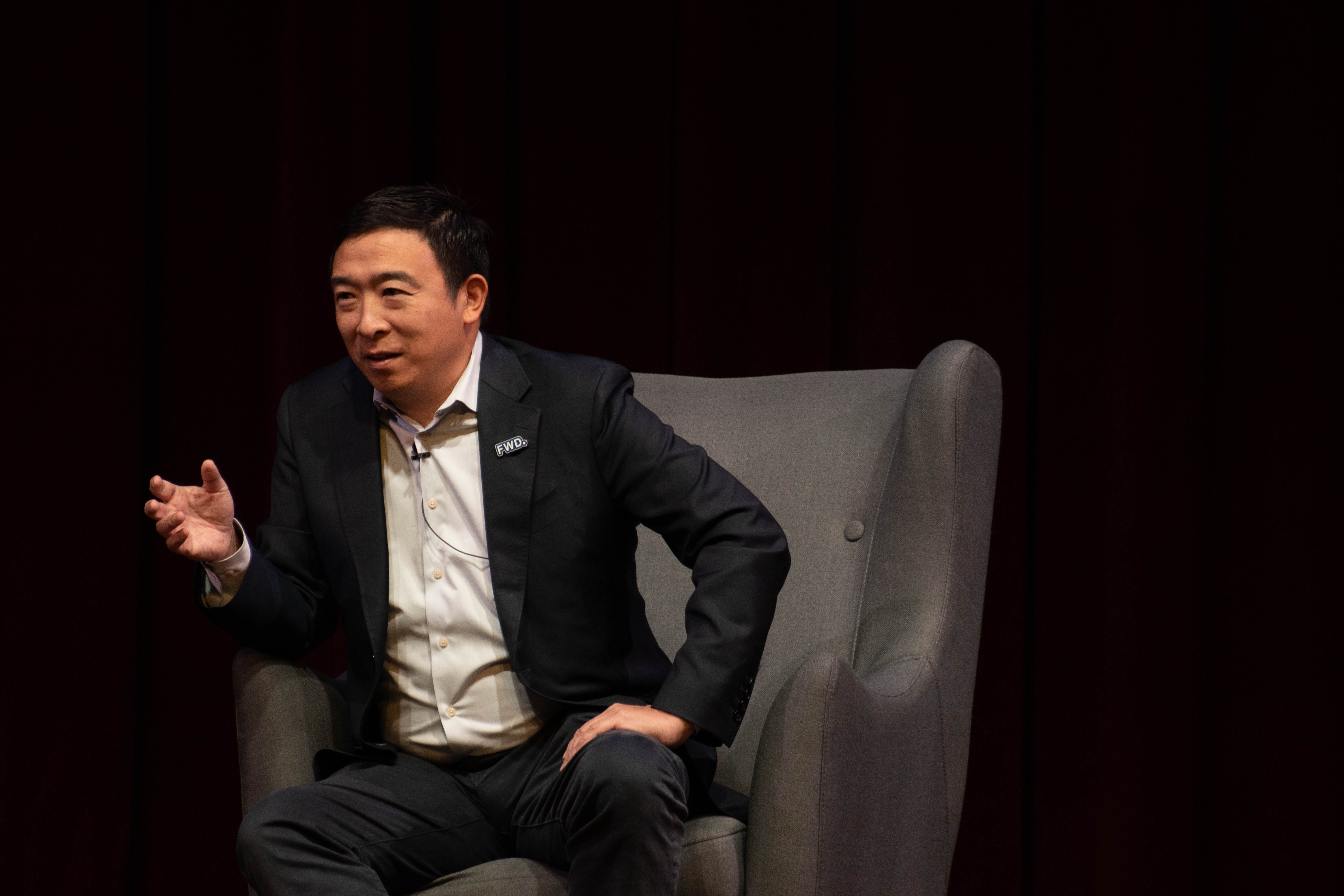“I’m back at the Farm!”
30 years after visiting campus as a prospective frosh, former 2020 U.S. presidential candidate and businessman Andrew Yang urged students, staff, faculty and alumni to support rank-choice voting and promoted his newly founded Forward Party at the keynote event for Democracy Day on Tuesday at Dinkelspiel Auditorium.
Yang, who ultimately chose to attend Brown, began his speech by leaping off of the stage to greet members of the audience. He said his presidential campaign spurred by Trump’s election in 2016 was never something he’d expected, both growing up and even during his primary campaign.
“I am Asian. I grew up [as] the child of immigrants. I did not grow up hearing, ‘You’re gonna run for president someday,’” Yang said. “I didn’t think I was gonna be president, I’ll be honest with y’all. I was trying to mainstream solutions that I thought would accelerate us out of this mess that we’re in.”
Yang’s presidential campaign was based around his proposal for a universal basic income (UBI) which he called the ‘freedom dividend’ for all Americans. He said he thought this policy would make him appear “to the left of Bernie.”
“But that’s not the way it went down. It turns out the ‘magical Asian man from the future’ gets his own bucket,” Yang said.

Christopher Maximos ’23, Stanford in Government chair and Democracy Day coordinating committee member, said Yang was selected as the keynote speaker to attract “people from all different parts of the campus” based on Stanford’s strengths in technology and research on democracy reform.
“Andrew really straddles those two lines really well in a way elected officials in either party establishment don’t,” Maximos said. “It’s not just about his party affiliation, but the fact that he is devoted to working on small-d democracy, for everyone and with people from all sides.”
Kyle Haslett ’25 called Yang’s speech “relatable” and “real” and said he was drawn to Yang in 2020 because he was “a big fan of UBI.”
“I think that it’s a great idea to kind of shift our view of society away from always being working to other more passionate inquiries, and I feel like UBI really helps with that,” Haslett said.
Yang also criticized the two-party system for its unresponsiveness to Americans’ needs, citing how a majority of Americans are unhappy with Congress but most incumbents continue to win their seats. Along with third parties and rank-choice voting, he proposed a Congressional “dashboard” scoring politicians’ actions.
“It was a U.S. senator who said to me that an issue was worth more unaddressed than addressed,” Yang said. “What we need to do is actually have an evidence-based government… then you will start to see genuine accountability for these abysmal results that are making Americans of any political alignment upset, inflamed, aggravated and crazy.”
Yang said many of Americans’ needs are not being met in areas including healthcare, workers’ rights and child tax credits.
“Our politics are now divorced from the reality of the ground for Americans… our politics has gotten reduced to ideological soundbites,” Yang said. “The fundamentals of the American Dream are that your kids are going to do better than you did. And now, kids are not doing better than their parents, and everyone’s fucking pissed off about it.”
With its moderate policies, Yang’s newly-founded Forward Party aims to bridge the political polarization between Democrats and Republicans. When questioned by the moderator, political science professor Adam Bonica, on the challenges of starting a third party in America, Yang pointed to rank-choice voting as the solution and said he would focus on making it as “mainstream” as UBI.
“God, I hope he succeeds, because our current voting system is very backwards,” Dina Razi ’26 said.
Razi said her perception of Yang changed after the event. “I kind of walked in having this perception that he’s not really a serious candidate, but I think even though he does have that very jokey air, he’s still very forward on what he wants. Cautiously optimistic is definitely how I would describe my stance on him now.”
Bonica echoed Razi, expressing support for some of Yang’s proposals. While Bonica said a third party emerging in the current status quo was difficult, rank choice voting was more realistic and could “allow for a bit of a beachhead for different political parties to be able to run without being spoilers.”
“We are overdue for a party realignment. One thing that’s true about America is that institutions change,” Bonica said.
Emma Wang ’26, who was also skeptical about the viability of a third party, said Yang’s influence on American politics had more weight than direct institutional changes.
“He reminds me a little bit of Bernie Sanders, who totally shifted the center of the Democratic Party to the left even though he never gained the nomination,” Wang said.
Other students in the audience said they had come to see Yang after supporting him since the start of his presidential campaign.
“I’m not into politics at all, but Andrew Yang is Asian and when he came onto the political scene, I was like, ‘That’s my guy,’” Yash Mehta ’26 said. “And I’ve been part of the Yang Gang ever since.”
